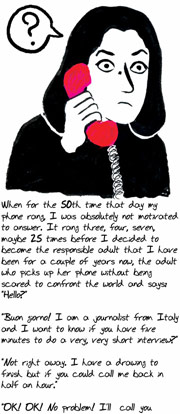An article in yesterday’s Washington Post — “Executive Wants to Charge for Web Speed” — brings us back to the question of pipes and the future of the internet.  The chief technology officer for Bell South says telecoms and cable companies ought to be allowed to offer priority deals to individual sites, charging them extra for faster connections. The Post:
The chief technology officer for Bell South says telecoms and cable companies ought to be allowed to offer priority deals to individual sites, charging them extra for faster connections. The Post:
Several big technology firms and public interest groups say that approach would enshrine Internet access providers as online toll booths, favoring certain content and shutting out small companies trying to compete with their offerings.
Among these “big technology firms” are Google, Yahoo!, Amazon and eBay, all of whom have pressed the FCC for strong “network neutrality” provisions in the latest round of updates to the 1996 Telecommunications Act. These would forbid discrimination by internet providers against certain kinds of content and services (i.e. the little guys). BellSouth claims to support the provisions, though the statements of its tech officer suggest otherwise.
Turning speed into a bargaining chip will undoubtedly privilege the richer, more powerful companies and stifle competition — hardly a net-neutral scenario. They claim it’s no different from an airline offering business class — it doesn’t prevent folks from riding coach and reaching their destination. But we all know how cramped and awful coach is. The truth is that the service providers discriminate against everyone on the web. We’re all just freeloaders leeching off their pipes. The only thing that separates Google from the lady blogging about her cat is how much money they can potentially pay for pipe rental. That’s where the “priorities” come in.
Moreover, the web is on its way to merging with cable television, and this, in turn, will increase the demand for faster connections that can handle heavy traffic. So “priority” status with the broadband providers will come at an ever increasing premium. That’s their ideal business model, allowing them to charge the highest tolls for the use of their infrastructure. That’s why the telecos and cablecos want to ensure, through speed-baiting and other screw-tightening tactics, that the net transforms from a messy democratic commons into a streamlined broadcast medium. Alternative media, video blogging, local video artists? These will not be “priorities” in the new internet. Maximum profit for pipe-holders will mean minimum diversity and a one-way web for us.
In a Business Week interview last month, SBC Telecommunications CEO Edward Whitacre expressed what seemed almost like a lust for revenge. Asked, “How concerned are you about Internet upstarts like Google, MSN, Vonage, and others?” he replied:
How do you think they’re going to get to customers? Through a broadband pipe. Cable companies have them. We have them. Now what they would like to do is use my pipes free, but I ain’t going to let them do that because we have spent this capital and we have to have a return on it. So there’s going to have to be some mechanism for these people who use these pipes to pay for the portion they’re using. Why should they be allowed to use my pipes?
The Internet can’t be free in that sense, because we and the cable companies have made an investment and for a Google or Yahoo! or Vonage or anybody to expect to use these pipes [for] free is nuts!
This makes me worry that discussions about “network neutrality” overlook a more fundamental problem: lack of competition. “That’s the voice of someone who doesn’t think he has any competitors,” says Susan Crawford, a cyberlaw and intellectual property professor at Cardozo Law School who blogs eloquently on these issues. She believes the strategy to promote network neutrality will ultimately fail because it accepts a status quo in which a handful of broadband monopolies dominate the market. “We need to find higher ground,” she says.
I think the real fight should be over rights of way and platform competition. There’s a clear lack of competition in the last mile — that’s where choice has to exist, and it doesn’t now. Even the FCC’s own figures reveal that cable modem and DSL providers are responsible for 98% of broadband access in the U.S., and two doesn’t make a pool. If the FCC is getting in the way of cross-platform competition, we need to fix that. In a sense, we need to look down — at the relationship between the provider and the customer — rather than up at the relationship between the provider and the bits it agrees to carry or block…
…Competition in the market for pipes has to be the issue to focus on, not the neutrality of those pipes once they have been installed. We’ll always lose when our argument sounds like asking a regulator to shape the business model of particular companies.
The broadband monopolies have their priorities figured out. Do we?
image: “explosion” (reminded me of fiber optic cable) by The Baboon, via Flickr


